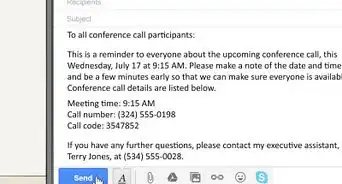This article was co-authored by Tami Claytor. Tami Claytor is an Etiquette Coach, Image Consultant, and the Owner of Always Appropriate Image and Etiquette Consulting in New York, New York. With over 20 years of experience, Tami specializes in teaching etiquette classes to individuals, students, companies, and community organizations. Tami has spent decades studying cultures through her extensive travels across five continents and has created cultural diversity workshops to promote social justice and cross-cultural awareness. She holds a BA in Economics with a concentration in International Relations from Clark University. Tami studied at the Ophelia DeVore School of Charm and the Fashion Institute of Technology, where she earned her Image Consultant Certification.
There are 7 references cited in this article, which can be found at the bottom of the page.
This article has been viewed 450,218 times.
Alerting someone at work to their body odor is a delicate matter, but it is important to protect them from further embarrassment, especially if you are in a management position and oversee how an employee presents themselves. It is crucial to discuss the issue privately and sensitively, but frankly, while assisting them to address the issue.
Steps
Discussing the Issue
-
1Imagine yourself in their place. In order to get over your own scruples (if you have any) about confronting the person at work who smells bad, put yourself in their shoes. Remind yourself that if you had a body odor problem that concerned your coworkers, you would want to know. Imagining yourself in their place will put you in the right frame of mind for the coming conversation.
-
2Talk privately with the person. In order to avoid embarrassing them more than you need to, find a quiet place to initiate the discussion. If you’re a manager, you can pull them into your office. If you’re just a coworker, pull them aside in the breakroom or another empty space when nobody else is about.[1]
- To talk privately with the smelly person, ask them, “Can I talk to you?” or “Do you have a moment to talk?”
Advertisement -
3Start the conversation with praise. Starting the conversation with praise will soften the blow and let the person know that you are not trying to be malicious. Be honest in your application of praise. If the person is not a good worker, for instance, do not suggest that they are. Find something else to praise them about.[2]
- Tell the smelly person, for instance, “You are a hard worker and a valuable member of this team.”
-
4Disarm the person who smells. Before you get into the actual issue of the worker’s stench, acknowledge that the conversation will be a bit uncomfortable but is necessary nonetheless. Disarming the person who smells in this manner will show them that you’re on their side and sympathize with their position.[3]
- Start by saying, for instance, “This is bit awkward, and I hope I don’t offend you, but...”
-
5Be as honest and direct as possible. If you leave the stinky person with vague comments about “hygiene,” they might think you’re asking them to brush their teeth to solve their bad breath. To avoid any confusion, be gentle but don’t mince words.[4]
- You could say, for instance, “You seem to have a disagreeable odor these days.”
- Never tell the smelly worker that anyone else has brought the issue to your attention. This will only cause them further embarrassment.
-
6Ask if they’re aware of their smell. After laying out the issue in gentle but explicit terms, find out if the person at work who smells bad knows that they smell bad. If someone at work who smells bad admits that they have a medical condition that causes them to emit a bad scent, thank them for being honest with you.[5]
- Ask, for instance, “Is this a problem you’re aware of?” or “Has anyone ever told you this before?” If they say it's due to a medical condition, you could say, "Oh, I'm so sorry I brought it up. Thank you for letting me know. I won't mention it again."
Coping with the Problem
-
1Suggest possible causes and solutions. When someone at work smells bad, they usually don’t know it. And if they don’t know it, they likely don’t know how to correct the problem. Offer helpful comments regarding the potential cause and possible suggestions for how to deal with the problem.[6]
- For instance, you might say, “Perhaps you just need to wash your clothes more often. Or maybe you could try showering more frequently.”
-
2Tell your boss about the issue. If, after telling someone at work they smell bad, they do not take reasonable and appropriate steps to freshen up, you should report the issue to a workplace superior. With luck, they will have more success than you did in correcting the coworker’s stench.[7]
-
3Apply pressure if necessary. If you’re in a management position and the person at work who smells bad is combative or disagrees with you, insist that they must come to work smelling fresh. Remind them that stinky workers reflect badly on the business and that failing to correct their foul odor could hurt their relationships with their coworkers.[8]
- Say, for instance, “We have a company policy that requires all workers to be fresh and clean at work.”
Minimizing the Stink
-
1Move to a different location. If possible, change your cubicle or desk. If moving altogether is not an option, try to at least find ways to minimize the amount of time you spend near the stinky colleague. For instance, volunteer to take on a different set of responsibilities that takes you to a different part of your workspace.[9]
-
2Cover the scent using candles or air fresheners. Scented candles are a great way to conceal an odor. You could also try a plug-in air freshener that sprays in automatic, regular intervals, or you could use a pressurized air freshener of the sort that comes in an aerosol can.[10]
-
3Set up a fan. Turning a fan toward you will keep the air circulating and dissipate your coworker’s stink. Setting up a fan will provide some relief from your smelly coworker.[11]
Expert Q&A
Did you know you can get expert answers for this article?
Unlock expert answers by supporting wikiHow
-
QuestionHow do I deal with a coworker who smells bad?
 Tami ClaytorTami Claytor is an Etiquette Coach, Image Consultant, and the Owner of Always Appropriate Image and Etiquette Consulting in New York, New York. With over 20 years of experience, Tami specializes in teaching etiquette classes to individuals, students, companies, and community organizations. Tami has spent decades studying cultures through her extensive travels across five continents and has created cultural diversity workshops to promote social justice and cross-cultural awareness. She holds a BA in Economics with a concentration in International Relations from Clark University. Tami studied at the Ophelia DeVore School of Charm and the Fashion Institute of Technology, where she earned her Image Consultant Certification.
Tami ClaytorTami Claytor is an Etiquette Coach, Image Consultant, and the Owner of Always Appropriate Image and Etiquette Consulting in New York, New York. With over 20 years of experience, Tami specializes in teaching etiquette classes to individuals, students, companies, and community organizations. Tami has spent decades studying cultures through her extensive travels across five continents and has created cultural diversity workshops to promote social justice and cross-cultural awareness. She holds a BA in Economics with a concentration in International Relations from Clark University. Tami studied at the Ophelia DeVore School of Charm and the Fashion Institute of Technology, where she earned her Image Consultant Certification.
Etiquette Coach
Warnings
- Be conscientious of those whose body odors inevitably stem from a legitimate medical condition.⧼thumbs_response⧽
References
- ↑ https://www.inc.com/alison-green/how-to-talk-to-an-employee-about-body-odor.html
- ↑ https://www.inc.com/alison-green/how-to-talk-to-an-employee-about-body-odor.html
- ↑ https://www.inc.com/alison-green/how-to-talk-to-an-employee-about-body-odor.html
- ↑ https://www.inc.com/alison-green/how-to-talk-to-an-employee-about-body-odor.html
- ↑ http://www.hrmorning.com/bob-you-smell-what-to-say-to-employees-about-embarassing-personal-issues/
- ↑ https://www.inc.com/alison-green/how-to-talk-to-an-employee-about-body-odor.html
- ↑ http://www.hrmagazine.co.uk/article-details/telling-a-colleague-they-smell-is-hardest-workplace-conversation
- ↑ https://www.inc.com/alison-green/how-to-talk-to-an-employee-about-body-odor.html
- ↑ http://www.hrmagazine.co.uk/article-details/telling-a-colleague-they-smell-is-hardest-workplace-conversation
- ↑ https://greatist.com/grow/cover-up-a-poop-smell
- ↑ http://www.hrmorning.com/bob-you-smell-what-to-say-to-employees-about-embarassing-personal-issues/
- ↑ Tami Claytor. Etiquette Coach. Expert Interview. 29 September 2020.
About This Article
Telling someone at work that they smell bad can be a little awkward, but you can pull them aside to an empty space so you don’t embarrass them in front of other people. Start by praising them about their work or an aspect of their personality to soften the blow. Then, be honest and direct so you don’t confuse them. For example, say something like, “This is a bit awkward and I hope I don’t offend you, but there seems to be a bit of a smell near you lately. Would you mind looking into that?” If they say it’s the result of a medical condition, thank them for being honest with you and apologize for bringing it up. For more tips, including how to minimize bad odors in your workplace, read on!









































































